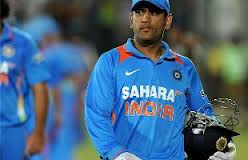
Indian cricket captain Mahendra Singh Dhoni blamed the unpredictable pitch for his team's abysmal batting performance in the lost second ODI against Sri Lanka, rejecting suggestions that rash shots led to the stunning collapse.
India were last night bowled out for 138 in 33.3 overs -- their fourth-lowest ODI total in the past five years -- by the host team, which chased down the target in under 20 overs. The five-match series is currently tied 1-1.
"The pitch was next to the wicket we played on last time but it behaved in a completely different way," Dhoni said referring to the track used for the opening ODI in which India posted a 300-plus score.
"Initially the wicket was slightly on the slower side. Once Virat (Kohli) got out we lost a couple of more wickets very quickly.
"Before the batsmen could assess the wicket, we lost two wickets played on. I thought after that it was too much for batsmen like Irfan (Pathan) and Ashwin to come in and take us out of trouble," he added.
But his opposite number, Mahela Jayawardene, disagreed with Dhoni insisting that the wicket was not that bad.
"Probably a touch slower, there were quite a few good balls as well. We bowled in good areas, created pressure, maybe couple of bad shots as well but I will take that any day.
"The important thing with the Indian batting line-up is picking up wickets and that's the only way we can control things and that is what we did today," he said.
Dhoni defended his batsmen's shot selection, refusing to call them rash.
"I don't think they were shots that were really rash. People were looking for singles. If you see Rohit's ball (the one off which he was dismissed), the shot was on. But he got an inside edge and it went onto the stumps.
"It could have been his lucky day if it hadn't hit the stumps and he was still there to carry on with his innings. It is part and parcel of the game and a big learning curve. Hope the batsmen learn and they assess the wicket very quickly (in the next game)," Dhoni explained.
The wicketkeeper-batsman said the wicket here lacked pace and was difficult to bat on.
"Over here the wicket was slightly different, it (the ball) was stopping before coming on. I don't think there was too much swing for the bowlers, though there was a bit of breeze - meaning you can swing it a bit - but nothing unusual.
"I just thought the pace of the wicket was not really coming onto the bat and that's the reason why we lost too many wickets initially."
India now move to Colombo for the third game of the series and Dhoni said that his team has learnt some important lessons from the Hambantota stay.
"The boys adjusted well to the conditions whether it was the bowling or the batting department. Today the performance wasn't so good but still, the kind of wind we faced here was the kind that one usually gets to see in Wellington in New Zealand," he said.
I think given the amount of time we had, we adjusted pretty well. So I am quite happy, (it was a) decent performance.
"Slowly and gradually you will see all the youngsters learning, especially about the importance of the middle overs, because that is where most of the cricket is played - right from the 15th-20th over, onwards till the 40th over," he added.





Comments
Add new comment